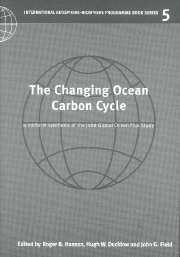Description
The Changing Ocean Carbon Cycle
A Midterm Synthesis of the Joint Global Ocean Flux Study
International Geosphere-Biosphere Programme Book Series, Vol. 5
Coordinators: Hanson Roger B., Ducklow Hugh W., Field John G.
Language: English
Subject for The Changing Ocean Carbon Cycle:
The changing ocean carbon cycle, a midterm systhesis of the joint global ocean flux study, paper
Publication date: 01-2000
528 p. · 17.6x24.8 cm · Paperback
Publication date: 01-2000
528 p. · 17.6x24.8 cm · Paperback
The changing ocean carbon cycle, a midterm systhesis of the joint global ocean flux study.
Publication date: 01-2000
528 p. · 18.2x25.5 cm · Hardback
Publication date: 01-2000
528 p. · 18.2x25.5 cm · Hardback
Description
/li>Contents
/li>
The world's oceans act as a reservoir, with the capacity to absorb and retain carbon dioxide. The air-sea exchange of carbon is driven by physico-chemical forces, photosynthesis and respiration, and has an important influence on atmospheric composition. Variability in the ocean carbon cycle could therefore exert significant feedback effects during conditions of climate change. The Joint Global Ocean Flux Study (JGOFS) is the first multidisciplinary programme to directly address the interactions between the biology, chemistry and physics of marine systems, with emphasis on the transport and transformations of carbon within the ocean and across its boundaries. This unique volume, written by an international panel of scientists, provides a synthesis of JGOFS science and its achievements to date. It will therefore appeal to all those seeking a recent overview of the role of ocean processes in Earth system science and their wider implications on climate change.
Part I. Introduction: 1. The evolution of the Joint Global Ocean Flux Study project J. J. McCarthy; Part II. Carbon Exchange Processes and Their Variability: 2. Marine primary production and the effects of wind E. Sakshaug, K. Tangen and D. Slagstad; 3. Net production, gross production and respiration: what are the interconnections and what controls them? P. J. le B. Williams; 4. The role of iron in plankton ecology and carbon dioxide transfer of the global oceans H. J. W. de Baar and P. W. Boyd; 5. The influence of iron on ocean biology and climate: insights from the IronEx studies in the equatorial Pacific P. S. Liss and S. M. Turner; 6. Testing importance of iron and grazing in maintenance of the high nitrate condition in the equatorial Pacific Ocean, a physical-biological model study F. Chai, S. T. Lindley, J. T. Toggweiler and R. T. Barber; 7. Continental margin carbon fluxes K.-K. Liu, K. Iseki and S.-Y. Chao; 8. Sediment trap sampling in surface waters: issues and recommendations W. D. Gardner; Part III. Regional-Scale Analysis and Integration: 9. Mixed-layer dynamics and primary production in the Arabian Sea S. Sathyendraneth and T. Platt; 10. Plankton ecology and biogeography in the Southern Ocean: a review of the Southern Ocean JGOFS U. Bathmann, J. Priddle, P. Tregeur, M. Lucas, J. Hall and J. Parslow; 11. Process studies in eutrophic, mesotrophic and oligotrophic oceanic regimes within the tropical northeast Atlantic A. Morel; 12. The North Atlantic carbon cycle: new perspectives from JGOFS and WOCE S. C. Doney, D. W. R. Wallace and H. W. Ducklow; 13. Temporal studies of biogeochemical dynamics in oligotrophic oceans A. F. Michaels, D. M. Karl and A. H. Knap; Part IV. Global-Scale Analysis and Integration: 14. Advances in ecosystem modelling within JGOFS M. J. R. Fasham and G. T. Evans; 15. Remote sensing of primary production in the ocean: promise and fulfilment T. Platt, S. Sathyendranath and A. Longhurst; Part V. Future Challenges: 16. Beyond JGOFS K. L. Denman and M. A. Pena; Part VI. Conclusion: 17. Some conclusions and highlights of JGOFS mid-project achievements J. G. Field, H. W. Ducklow and R. B. Hanson.
© 2024 LAVOISIER S.A.S.




